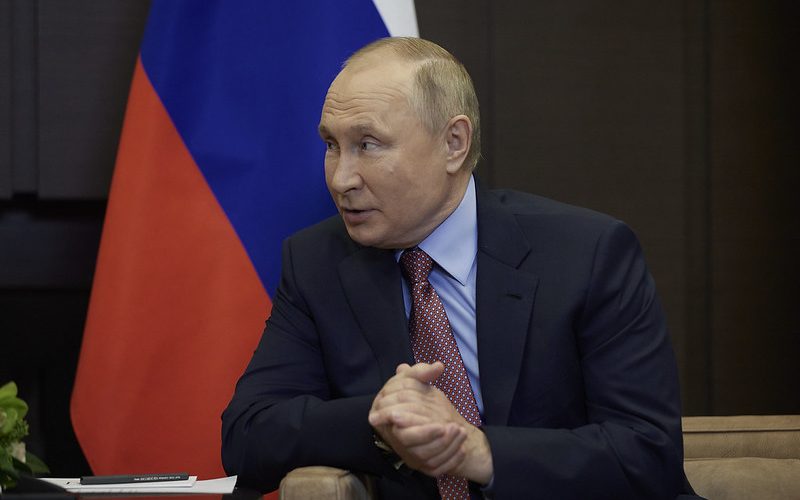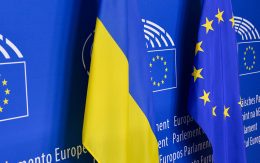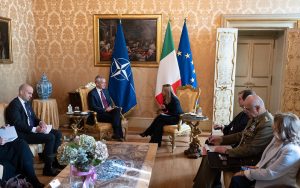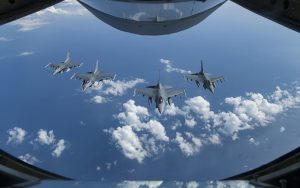I always saw Vladimir Putin as a tactical, rational decision maker, who undertook calculated risks on the international stage in order to achieve Russian national interests. The full scale invasion of Ukraine ordered by Putin, which started on 24th of February, deviates from this perception. He miscalculated the ability of his military to wage blitzkrieg and he underestimated the Ukrainians’ willingness to fight to the last man for their country. Ukraine is his Afghanistan and this mistake will be his end. The consequences of the invasion however do not just reflect on Putin and the Kremlin’s inner circle. The consequences of the invasion will be felt throughout the world because Putin changed the international order in just one day. So what can the West do about it?
Some in international affairs may not agree with my perception of Putin as a rational actor, considering the malign actions he undertook in the past few years. Supporting Assad in Syria, conducting various assassination attempts across Europe which culminated in the poisoning of Alexei Navalny1, meddling in the United States elections and annexing Crimea. The thing is, these were all rational decisions, calculated risks. Highly immoral, yes, but rational. A full-scale invasion of Ukraine with the hopes of conducting regime change in Kyiv is a delusional strategy but Putin felt emboldened by all of the previous strategic wins (some outlined above) during which the West, meaning the EU and the US, only responded very mildly. These past wins made him think he could pull this off, in addition to hoping that European disunity would keep him safe from sanctions and international condemnation.
To my surprise, the European Union was able to unify and provide a crippling set of sanctions to impose on Russia, Putin himself and his inner circle in the Kremlin. This was in no small part to the leadership of the Biden administration’s foreign policy team which united EU and NATO allies around a clear cut strategy: making Russia pay economically for the aggression and intensifying the support of Ukraine’s resistance forces. The European Commission even agreed to provide offensive weapons2 to Ukraine and even Germany is sending anti-tank weapons. All of this is needed in the short term, while the war rages on, but I fear that we have entered into an extremely volatile era of international affairs. The Chinese Communist Party also has territorial aspirations regarding Taiwan and most certainly they were observing the international reaction to the invasion of Ukraine. This is exactly why the international community cannot afford to go easy on Russia or lift some of the sanctions. Quite the contrary, they need to apply even more pressure on Russia, make its economy collapse completely and make sure that other authoritarian systems understand that the world will not stand for wars of conquest.
Additional pressure on Russia also serves to motivate its citizens to rise up en mass against the Putin regime and take control of their own future. The invasion emboldened separatist tendencies across Europe, primarily in the Western Balkans. Montenegro, Bosnia and Herzegovina and Kosovo will be destabilized in the near future by the Kremlin through its proxy forces in Belgrade but also in Zagreb.
In geopolitics, when dealing with the Russians, you need to make them react to you which is exactly why NATO needs a new enlargement strategy. Speed up the accession process of Bosnia and Herzegovina to NATO as well as of Georgia, accept Finland and Sweden if they show aspirations to join, put up a US base in Kosovo until its status has been resolved and then let them join the Alliance as well. Ukraine should be fast track accepted into the European Union so they could have access to more financial assets.
In the case of Bosnia and Herzegovina, these steps are necessary because its neighbors still have territorial aspirations, primarily Serbia through its proxy Republic of Srpska. Destabilizing activities are conducted along that line from official Belgrade, supported by Russian intelligence services. Bosnia and Herzegovina’s armed forces are interoperable with NATO forces and the country as a whole was successful in implementing all NATO requirements. The main requirement for membership is left half-finished because the political elite from the entity of the Republic of Srpska keeps sabotaging the work of government institutions. The main requirement was introduced in Tallinn in 2010 and it deals with the registration of immovable defense property from the entity to the state level.
So now that the international system has been turned upside down, the Western world needs to implement additional international economic sanctions and complete the isolation of both Russia and Belarus. These need to be priority policies for the international community as well as keeping up the political support and delivery of weapons to Ukraine. Energy independence from Russia also needs to be a key priority for the European Union, which can be achieved through cooperation with the United States. For that to happen, the US needs to achieve global dominance in the energy sector. NATO needs to fast track the enlargement to Bosnia and Herzegovina, Finland, Sweden and Georgia to tie up loose ends. International alliances need to be strengthened and preserved because authoritarian systems will still continue to cause instability in certain regions of the world like the Western Balkans and in East Asia. Finally, even if Putin manages to invade Kyiv and install a puppet government, he cannot afford financially to have his forces stationed all across Ukraine for a longer period of time in order to ensure the security of a puppet government. One thing is for certain, Ukrainian people will continue to fight so it would only be a matter of time before that puppet government falls. Putin’s only exit is either to leave his grip on power or to force an agreement out of Ukraine for recognition of the independence of separatist-held areas. That would be a dangerous new precedent but as I stated in the beginning, we have ushered into a new era of international affairs, where everything is not what it used to be.
Sources Shuster, S. (2022, January 19). The Man Putin Fears. Time. Retrieved February 28, 2022, from https://time.com/6140102/alexei-navalny-russia-profile/ Basu, Z. (2022, February 28). EU to purchase and deliver weapons to Ukraine in historic first. Axios. https://www.axios.com/eu-weapons-ukraine-russia-invasion-331bfcbc-5193-47b0-8afb-03f194d95619.html
Footnotes
- Shuster, S. (2022, January 19). The Man Putin Fears. Time. Retrieved February 28, 2022, from https://time.com/6140102/alexei-navalny-russia-profile/ [>]
- Basu, Z. (2022, February 28). EU to purchase and deliver weapons to Ukraine in historic first. Axios. https://www.axios.com/eu-weapons-ukraine-russia-invasion-331bfcbc-5193-47b0-8afb-03f194d95619.html [>]








Be First to Comment